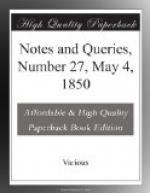We shall probably next week indulge in a few QUERIES which have suggested themselves to us, and to which Mr. Cunningham will perhaps be good enough to reply.
* * * * * {437}
ANECDOTE OF CHARLES I.
I have great pleasure in forwarding to you an anecdote of the captivity of Charles I., which I think will be considered interesting to your readers. Of its authenticity there can be no doubt. I extract it from a small paper book, purchased some fifty years since, at Newport, in the Isle of Wight, which contains the history of a family named Douglas, for some years resident in that town, written by the last representative, Eliza Douglas, at the sale of whose effects it came into my grandfather’s hands. There are many curious particulars in it besides the anecdote I have sent you; especially an account of the writer’s great-great-grandfather (the husband of the heroine of this tale), who “traded abroad, and was took into Turkey as a slave,” and there gained the affections of his master’s daughter, after the most approved old-ballad fashion; though, alas! it was not to her love that he owed his liberty, but (dreadful bathos!) to his skill in “cooking fowls, &c. &c. in the English taste;” which, on a certain occasion, when some English merchants came to dine with his master, “so pleased the company, that they offered to redeem him, which was accepted; and when freed he came home to England, and lived in London to an advanced age; so old that they fed him with a tea-spoon.”
After his death his wife married again; and it was during this second marriage that the interview with King Charles took place.
“My mother’s great-grandmother, when a-breeding with her daughter, Mary Craige, which was at y’e time of King Charles being a prisoner in Carisbrook Castle, she longed to kiss the King’s hand; and when he was brought to Newport to be carried off, she being acquainted with the gentleman’s housekeeper, where the King was coming to stay, till orders for him to leave the island, she went




